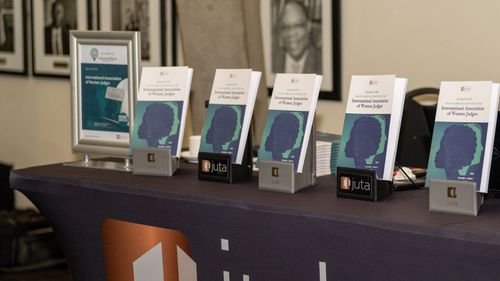- Home
- Products & Services
- About
- Blog
- Faq
- Contact Us
The mission of the South African Law Reform Commission (SALRC) is the continuous reform of all branches of law of South Africa in accordance with the principles and values of the Constitution to meet the needs of a changing society operating under the rule of law.
As part of their venture to fulfil this mandate and with Juta as a sponsor, the SALRC invites all law students studying towards an LLB or LLM at a South African University to submit their innovative ideas championing law reform issues into the annual South African Law Reform Commission Legal Essay Writing Competition, the 2022 results of which were announced last month at the annual event.
The runner-up in the LLB category was UWC student Wesley January with a trending topic affecting many in not only Southern Africa, but those knocking on our door internationally: “A CALL FOR REFORM ON THE SOUTH AFRICAN CRITICAL SKILLS WORK VISA.”
The Critical Skills List encompasses a variety of essential skills required to help the South African economy grow, but are in short supply within the natural talent pool of the country. The Critical Skills Work Visa purports to cater to “applicants in possession of exceptional skills or qualifications that are scarce in South Africa” but internal problems within processes are seeing a massive backlog in the Department of Home Affairs, and a corresponding shortfall within both these much-needed industries as well as the greater affluence of our country.
January pulls on his own personal experience working and legal insights to compare the South African system with successful international ones, and discusses not only how it can be optimised, but what is needed to get us there.
What was your inspiration for participating in the SALRC essay writing competition?
I first became interested in participating in the SALRC essay writing competition during my first year of studies when I saw the competition poster on campus. At the time, I had so many ideas on how the law could be developed but felt that I lacked the writing ability to translate my thoughts to paper in a meaningful way. As such, I waited for my final year to submit my essay.
Your essay focused on a call for reform on the South African critical skills work visa. What was your personal inspiration for writing on this topic?
My inspiration for writing on the reform of the critical skills work visa stems from prior working experience where I had the benefit of working in the area of South African immigration law and thereafter in the area of Australian Immigration law. In this time, I assisted clients with applications for the Critical Skills Work visa and the Australian General Skilled Migration Skilled Independent visa, both relating to the immigration of skilled migrants. My experience enabled me to identify certain issues in the current critical skills work visa regime and showed me how South Africa can benefit from adopting some of the approaches taken by Australia.
In your essay, you noted with concern, the impact of the current CSW visa on the South African labour market and how in its current form, the CSW visa contributes and competes with South Africa's unemployment crisis. With that in mind and if there is no urgency around reform of the CSW visa, what do you see as the long-term impact for the country?
Should the framework surrounding the visa not be developed urgently, I anticipate that South Africa will experience an ongoing influx of foreign workers in listed occupations with lower experience and qualification criteria, resulting in competition between those foreign workers and unemployed South African citizens. Control mechanisms such as a quota system are necessary to ensure that the required skills are imported through the employment of foreign workers.
The issues you raise in your essay articulate both the complexities and foreseeable challenges around reform of the CSW visa. In your perspective, is there enough public awareness of the impact of the current CSW visa on the South African labour market for it to become a priority for reform?
In conducting research for my essay, I did not discover any academic writing or news articles relating to the issues raised in my essay. It is therefore evident that there is no general awareness regarding the impact of the current critical skills work visa on the South African labour market.
Can you share with us what kind of change or transformation you would like to see in the justice system?
Since the inception of the current Constitution, major steps have been taken to protect vulnerable members in society and to make justice accessible for all. I would like to see further steps being taken so as to ensure that everyone enjoys equal protection in South Africa, including creating awareness of rights for consumers, employees, children and human rights generally; and developing the law so as to give consumers and employees more negotiating power in their respective contractual relationships.
Can you share some of your personal aspirations around the difference you would like to make in the field of law?
Despite many developments in the aforementioned areas of law, I have observed in my interactions with many people that -
employers, suppliers and lenders exploit the ignorance of employees and consumers, respectively; and
when these parties feel aggrieved, they are uncertain as to whether there is any action available to them or how to go about taking the appropriate steps. I would like to see the law develop to the extent that the potential for abuse of power is curtailed in the aforementioned unequal relationships.
Are there any acknowledgements or recognition of thanks you would like to share with anyone who supported you during the competition?
I would like to thank my partner and family for their ongoing support throughout this process. I would also like to thank my supervisor, Mrs Kim Loedolf, Mr Yossi Witkowsky and the University of the Western Cape for their support in the competition and assistance with my essay.
Read the full essay here.

Kagiso Tiso & Kagiso Media Fraud Hotline: 0800 21 25 83


